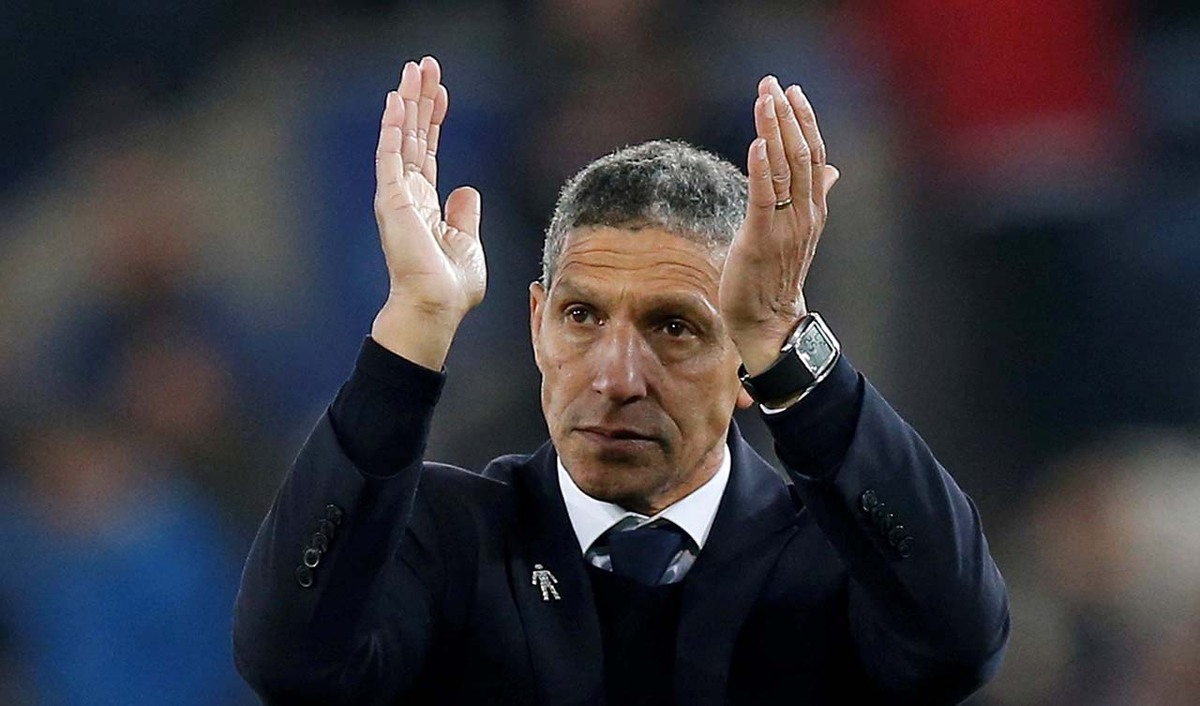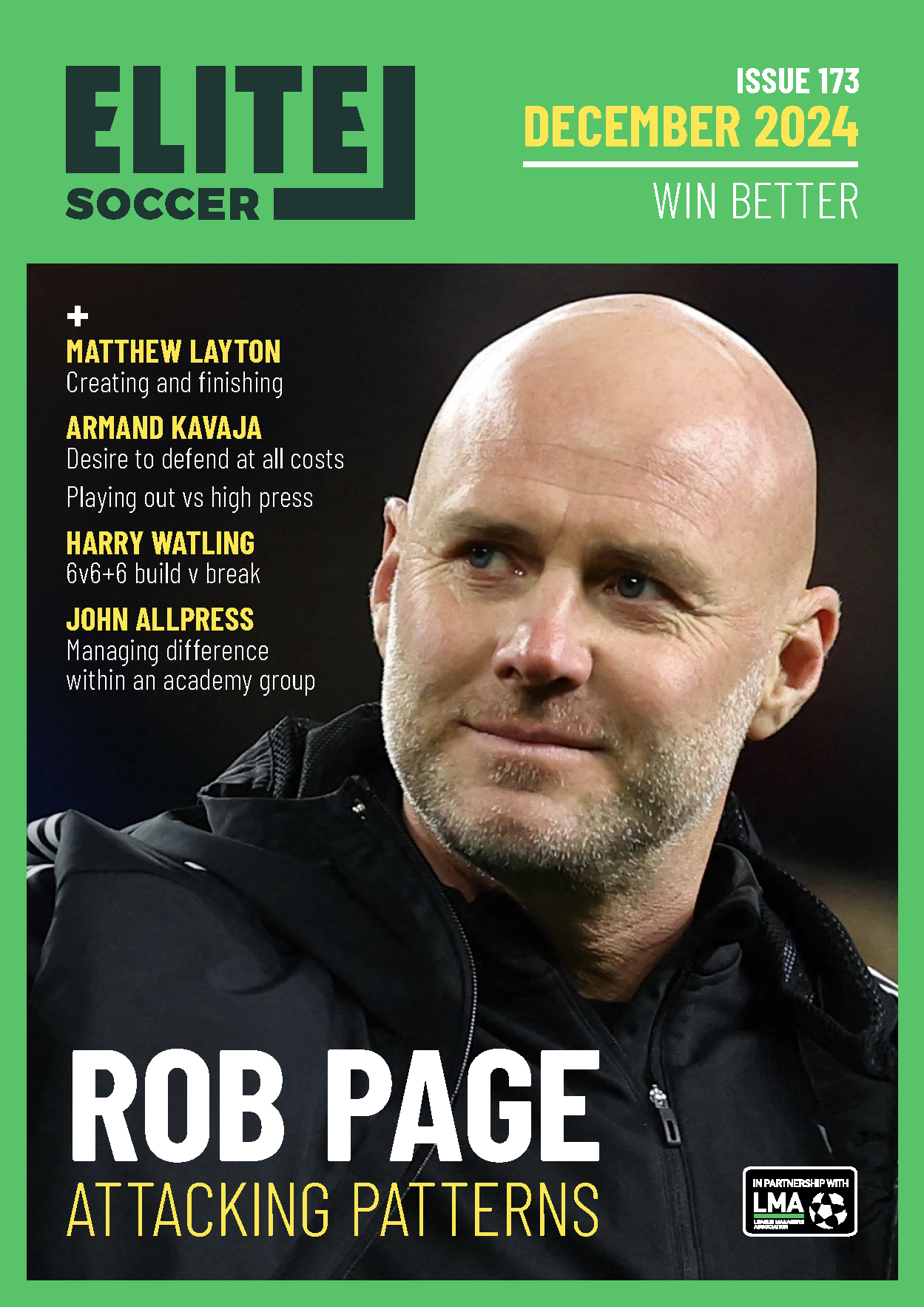You are viewing 1 of your 1 free articles
Modesty in management
Modest and measured in his approach, Chris Hughton is a rare find in the world of senior management. Confident in his own personality and abilities, Hughton has no reservations about drawing inspiration from a host of managers, past and present.
While Chris Hughton remains true wherever possible to his calm and thoughtful style of leadership, underneath is a steel and determination that enables him to deal with the tough scenarios that inevitably arise in football, albeit in a respectful manner. It is perhaps because of this considered, well-balanced and open style of leadership that he has become one of the most employable and universally liked managers around.
Hughton retired from his 14-year playing career in 1993, aged 34, having spent 13 years with Tottenham Hotspur and brief spells with West Ham United and Brentford. During that time, he also earned 53 caps for the Republic of Ireland - Hughton is the son of an Irish mother and a Ghanaian father - becoming the first mixed-race player to represent the country.
When retirement beckoned in 1993, it came as little surprise to those who knew him that he pursued a career in the dugout, having shown an interest in coaching during the latter stages of his playing career.
During a 14-and-a-half-year coaching tenure on Tottenham’s backroom staff, Hughton worked as a coach under the likes of Glenn Hoddle, George Graham and Martin Jol. He also served as caretaker manager on several occasions before his departure from the club in 2007.
A year after leaving Tottenham, Hughton joined Newcastle United as first-team coach under Kevin Keegan. During the close season of 2009, he was appointed as caretaker manager of the club and promoted to permanent manager in November of that year. His first season in charge was outstanding – the side were unbeaten at home and went on to win the 2010 Championship title and promotion back to the Barclays Premier League. Hughton won the LMA Championship Manager of the Year, not to mention the respect and admiration of the Newcastle team and supporters.
But despite his success at the club, Hughton soon found himself out of a job, to the widespread disbelief and anger of his loyal supporters, team and many observers across the football community. Newcastle were, at the time, a very respectable 11th in the table.
In spite of the setback, Hughton showed remarkable resilience and it is testament not only to his proven ability, but also his likeability and desirability as a manager that he was soon offered another job, this time at Birmingham City. There, he made an immediate impact in the 2011/2012 season, taking the side to fourth in the league and into the group stages of the Europa League, before leaving to move back into the Barclays Premier League as manager of Norwich City.
You coached at Tottenham for 14-and-a-half years before embarking on management - how well did that prepare you?
It was invaluable and formed the foundation of all of my philosophies as a manager. Such a long apprenticeship might not be for everyone and some can go straight from player to manager at a young age, but I wouldn’t have been ready. I worked under seven managers while coaching at Spurs, so there was always something new to learn and experience. It was exciting to see what each new manager would be like, how he would involve me and what I would learn. The club could easily have said, ‘now that the manager has left we won’t be keeping you on’, but they showed faith in my abilities and, in return, I provided some continuity.
You then moved away from London for the first time to join Kevin Keegan at Newcastle - how big an adjustment was that?
When I lost my job at Tottenham after almost 15 years on the coaching staff my ambition was to find a completely new challenge. I’d spent my entire playing and coaching career in London, but any apprehension I felt at relocating to another part of the country was outweighed by the excitement. I was going to a legendary club with an incredible tradition, rich history and great fan base and I was going to assist Kevin Keegan. I learned a lot from him during our time together, especially from his strengths in man-management.
When the club appointed you manager were you ready?
Absolutely, although however much preparation you have as a coach, when you cross that line into management it is completely different.
My first job as manager of Newcastle was far from the stable, calm environment you would want when starting out. The team had just been relegated, we’d lost a lot of players and the club was up for sale. I had to dig deep and draw on the wealth of experience I’d gained as a coach. I knew I still had a good squad, so the challenge was making sure each and every one pushed in the right direction to get us back into the Barclays Premier League.
Central to that was creating the right environment at the training ground, because the training pitch can provide great solace for players. I knew that if I could get everyone on board, we could be a strong force in the Championship.
Despite successfully guiding the club back to the top flight, you were sacked the following season. How do you reflect on that?
I was disappointed, but I didn’t let it knock my confidence and self belief. It helped to know that many managers and others in football thought I’d done a good job at Newcastle. The reaction was terrifically supportive. My coping mechanism was to keep busy and prepare for the next job.
That came at Birmingham city, who you led to the play-offs in your first year. The opportunity then came to manage Norwich city - was that a tough decision?
Yes, because although it was challenging at times - especially in the aftermath of relegation from the Barclays Premier League - I really enjoyed my year with Birmingham.
My decision to leave was based on what Norwich City had to offer - the chance to return to managing at Premier League level at a club that had made great strides in the preceding seasons. It very much whetted my appetite.
You’re known as a real gentleman of the game. How does that translate into your conduct as a leader? How do you treat your players?
It’s very difficult to lead outside of your personality. Look at most managers and you’ll get a sense of what they are like and how they lead. I try as much as possible to be accessible to the players and staff, respectful and honest with them. I have always felt that it’s important to create an environment that players enjoy and buy into, where they want to do their best for each other and commit to a team ethic. The team is more important than any individual, so I also try to treat everybody the same.
Unfortunately, there will always be times in management when things don’t run smoothly and moments when you need to be strong with the players. Discipline is part and parcel of the game. But, even then, it is not in my personality to be overly confrontational - I’d rather deal with someone in a respectful way, spend time with them and find a solution. However, when a situation arises that requires discipline I am more than capable of handling it.
Having been a coach, what type of dynamic do you look to engender with your own coaching staff?
As a manager who is used to coaching it can be difficult to delegate, but it’s important to appreciate the job the coaching staff do, step back when appropriate and allow them to take sessions with the team and express themselves. Most managers need to delegate more anyway, because of the range of responsibilities they now have.
When appointing coaching staff, aside from having a good training, trust and loyalty come first. You need people you can get on with. Often, though, you will look to appoint coaches who are a little bit different to you so you have a good balance of opinions. I have a great staff around me and I expect high standards from them. We make sure that we set the standards we expect from our players.
You can prepare within the training environment, but how do you get players mentally tuned on match day?
Your influence on match day is really just about any changes that you decide to make and the team you select. You remind them of certain vital information in the pre-match meeting and everything else is down to how they are feeling on the day. At that point, there is only so much you can do. You have to be confident in the overriding philosophy that you have employed at the club and the work that you have done on the training pitch over a period of time. It should ensure the players believe in their ability to win and are ready for most things.
You were the first mixed-race player to represent the Republic of Ireland and are an incredibly positive role model for black coaches and managers. How important is that to you?
First and foremost I’m a manager, but I am, of course, also black. While we’ve certainly seen some positive changes at grassroots and academy level, where there are more black coaches, there still aren’t at the top level. It is something I am very conscious of and I get a lot of letters and feedback. If, in any way, that helps somebody to make progress, inspires them or changes thinking within the game then, yes, it is something I am very proud of.”
Editor's Picks
Using the goalkeeper in build-up play
Pressing principles
Intensive boxes drill with goals
Penetrating the final third
Creating and finishing
My philosophy
Pressing initiation
Compact team movement
Defensive organisation
Coaches' Testimonials

Alan Pardew

Arsène Wenger

Brendan Rodgers

Carlos Carvalhal

José Mourinho

Jürgen Klopp

Pep Guardiola

Roy Hodgson

Sir Alex Ferguson

Steven Gerrard
Coaches' Testimonials

Gerald Kearney, Downtown Las Vegas Soccer Club

Paul Butler, Florida, USA

Rick Shields, Springboro, USA

Tony Green, Pierrefonds Titans, Quebec, Canada
Join the world's leading coaches and managers and discover for yourself one of the best kept secrets in coaching. No other training tool on the planet is written or read by the calibre of names you’ll find in Elite Soccer.
In a recent survey 92% of subscribers said Elite Soccer makes them more confident, 89% said it makes them a more effective coach and 91% said it makes them more inspired.
Get Monthly Inspiration
All the latest techniques and approaches
Since 2010 Elite Soccer has given subscribers exclusive insight into the training ground practices of the world’s best coaches. Published in partnership with the League Managers Association we have unparalleled access to the leading lights in the English leagues, as well as a host of international managers.
Elite Soccer exclusively features sessions written by the coaches themselves. There are no observed sessions and no sessions “in the style of”, just first-hand advice delivered direct to you from the coach.





